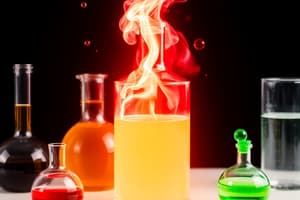Podcast
Questions and Answers
What is a characteristic of a double-replacement reaction?
What is a characteristic of a double-replacement reaction?
- No reactants are altered during the reaction.
- One element completely combines with another.
- A single element forms a new compound with two others.
- Two elements switch places to form two new compounds. (correct)
What does nuclear radiation consist of?
What does nuclear radiation consist of?
- Photons released during a physical change.
- Electrons emitted during a chemical reaction.
- Chemical bonds within a compound.
- Energy and particles emitted during a nuclear reaction. (correct)
Which statement about radioactive decay is true?
Which statement about radioactive decay is true?
- It cannot be observed in elements with atomic numbers under 83.
- It only occurs in stable isotopes.
- It results in the creation of new elements without radiation.
- It involves the emission of particles and/or energy. (correct)
How does beta decay affect the mass number of a nucleus?
How does beta decay affect the mass number of a nucleus?
What is the equation that relates mass to energy according to Einstein?
What is the equation that relates mass to energy according to Einstein?
Which factor influences the stability of a nucleus?
Which factor influences the stability of a nucleus?
What is the definition of an alpha particle?
What is the definition of an alpha particle?
What happens during the emission of a beta particle?
What happens during the emission of a beta particle?
What best defines a chemical change?
What best defines a chemical change?
Which of the following is NOT a commonly recognized example of a chemical change?
Which of the following is NOT a commonly recognized example of a chemical change?
What is a reactant in a chemical reaction?
What is a reactant in a chemical reaction?
How can the change in heat energy during a chemical reaction be detected?
How can the change in heat energy during a chemical reaction be detected?
Which statement about products in a chemical reaction is true?
Which statement about products in a chemical reaction is true?
Which of the following is an example of a precipitate forming?
Which of the following is an example of a precipitate forming?
What occurs when chemical bonds are formed during a chemical reaction?
What occurs when chemical bonds are formed during a chemical reaction?
Which evidence would indicate a chemical reaction has occurred?
Which evidence would indicate a chemical reaction has occurred?
What defines a concentrated solution?
What defines a concentrated solution?
Which of the following factors does NOT increase the rate of a reaction?
Which of the following factors does NOT increase the rate of a reaction?
How does increasing the temperature generally affect the rate of a reaction?
How does increasing the temperature generally affect the rate of a reaction?
Which of the following examples illustrates a slow chemical reaction?
Which of the following examples illustrates a slow chemical reaction?
What effect does stirring have on the rate of a reaction?
What effect does stirring have on the rate of a reaction?
Which statement is true regarding exothermic and endothermic reactions?
Which statement is true regarding exothermic and endothermic reactions?
How does increasing the concentration of reactants affect a reaction rate?
How does increasing the concentration of reactants affect a reaction rate?
What happens to the rate of reaction when the contact surface area is increased?
What happens to the rate of reaction when the contact surface area is increased?
What is the primary reason catalysts are not considered reactants in a chemical reaction?
What is the primary reason catalysts are not considered reactants in a chemical reaction?
What type of reaction is characterized by the release of heat?
What type of reaction is characterized by the release of heat?
Which factor does NOT typically increase the rate of a chemical reaction?
Which factor does NOT typically increase the rate of a chemical reaction?
In a synthesis reaction, what occurs?
In a synthesis reaction, what occurs?
How does the combustion of glucose in living organisms differ from its combustion in a fire?
How does the combustion of glucose in living organisms differ from its combustion in a fire?
Which of the following reactions is an example of a decomposition reaction?
Which of the following reactions is an example of a decomposition reaction?
What distinguishes a nuclear reaction from a chemical reaction?
What distinguishes a nuclear reaction from a chemical reaction?
Which of the following best explains the energy exchange in a chemical reaction?
Which of the following best explains the energy exchange in a chemical reaction?
What indicates that a chemical equation is balanced?
What indicates that a chemical equation is balanced?
Which statement correctly describes the conservation of mass in a chemical reaction?
Which statement correctly describes the conservation of mass in a chemical reaction?
Why are only whole numbers used as coefficients in chemical equations?
Why are only whole numbers used as coefficients in chemical equations?
Which of the following correctly represents the state of a solid in a chemical equation?
Which of the following correctly represents the state of a solid in a chemical equation?
What is the purpose of coefficients in a balanced chemical equation?
What is the purpose of coefficients in a balanced chemical equation?
How is an ionic equation represented for a reaction?
How is an ionic equation represented for a reaction?
How does the concentration of reactants behave during a fast reaction rate?
How does the concentration of reactants behave during a fast reaction rate?
What does a balanced equation symbolize regarding the energy in a chemical reaction?
What does a balanced equation symbolize regarding the energy in a chemical reaction?
Which branch of physics focuses on the relationships between forces and motion?
Which branch of physics focuses on the relationships between forces and motion?
What is the primary purpose of using mathematical models in science?
What is the primary purpose of using mathematical models in science?
Which of the following steps is the first in the scientific inquiry process?
Which of the following steps is the first in the scientific inquiry process?
What is an example of a hypothesis?
What is an example of a hypothesis?
What does the control group in an experiment serve as?
What does the control group in an experiment serve as?
What differentiates quantitative data from qualitative data?
What differentiates quantitative data from qualitative data?
What is the defining characteristic of a variable in an experiment?
What is the defining characteristic of a variable in an experiment?
Which statement best defines inference in scientific inquiry?
Which statement best defines inference in scientific inquiry?
Flashcards
Chemical Change
Chemical Change
A change in which one or more new substances are formed.
Chemical Reaction
Chemical Reaction
The process of rearranging atoms in substances to create new substances.
Reactant
Reactant
A substance that undergoes a chemical change in a reaction.
Product
Product
Signup and view all the flashcards
Energy in Reactions
Energy in Reactions
Signup and view all the flashcards
Detecting Heat Change
Detecting Heat Change
Signup and view all the flashcards
Precipitate
Precipitate
Signup and view all the flashcards
Evidence of Chemical Change
Evidence of Chemical Change
Signup and view all the flashcards
Double-replacement Reaction
Double-replacement Reaction
Signup and view all the flashcards
Nuclear Reaction
Nuclear Reaction
Signup and view all the flashcards
Nuclear Radiation
Nuclear Radiation
Signup and view all the flashcards
Radioactive Decay
Radioactive Decay
Signup and view all the flashcards
Alpha Particle
Alpha Particle
Signup and view all the flashcards
Alpha Decay
Alpha Decay
Signup and view all the flashcards
Beta Particle
Beta Particle
Signup and view all the flashcards
Beta Decay
Beta Decay
Signup and view all the flashcards
Reaction Rate
Reaction Rate
Signup and view all the flashcards
Concentration
Concentration
Signup and view all the flashcards
Effect of Temperature on Reaction Rate
Effect of Temperature on Reaction Rate
Signup and view all the flashcards
Effect of Particle Size on Reaction Rate
Effect of Particle Size on Reaction Rate
Signup and view all the flashcards
Effect of Reactant Concentration on Reaction Rate
Effect of Reactant Concentration on Reaction Rate
Signup and view all the flashcards
Effect of Agitation on Reaction Rate
Effect of Agitation on Reaction Rate
Signup and view all the flashcards
Exothermic/Endothermic Reactions & Rate
Exothermic/Endothermic Reactions & Rate
Signup and view all the flashcards
Factors Affecting Reaction Rate
Factors Affecting Reaction Rate
Signup and view all the flashcards
Ionic Equation
Ionic Equation
Signup and view all the flashcards
Balanced Equation
Balanced Equation
Signup and view all the flashcards
Conservation of Mass
Conservation of Mass
Signup and view all the flashcards
Why Whole Numbers?
Why Whole Numbers?
Signup and view all the flashcards
States of Matter Symbols
States of Matter Symbols
Signup and view all the flashcards
Exothermic Reaction
Exothermic Reaction
Signup and view all the flashcards
Endothermic Reaction
Endothermic Reaction
Signup and view all the flashcards
Branches of Physics
Branches of Physics
Signup and view all the flashcards
Mathematical Models
Mathematical Models
Signup and view all the flashcards
Scientific Inquiry: Observation
Scientific Inquiry: Observation
Signup and view all the flashcards
Scientific Inquiry: Questioning
Scientific Inquiry: Questioning
Signup and view all the flashcards
Inference
Inference
Signup and view all the flashcards
Hypothesis
Hypothesis
Signup and view all the flashcards
Control Group
Control Group
Signup and view all the flashcards
Experimental Group
Experimental Group
Signup and view all the flashcards
Catalyst
Catalyst
Signup and view all the flashcards
Chemical Energy
Chemical Energy
Signup and view all the flashcards
Synthesis Reaction
Synthesis Reaction
Signup and view all the flashcards
Decomposition Reaction
Decomposition Reaction
Signup and view all the flashcards
Combustion Reaction
Combustion Reaction
Signup and view all the flashcards
Study Notes
Chemical Changes and Reactions
- A chemical change involves the formation of one or more new substances.
- Burning, cooking food, and the rusting of iron are examples of chemical changes.
- A chemical reaction is a process that rearranges atoms in substances to form new substances.
- Reactants are the starting substances in a chemical reaction.
- Products are the substances formed in a chemical reaction.
- Chemical reactions can involve more than two reactants and products.
- Energy is either absorbed or released during chemical reactions. Bonds breaking requires energy, while bond formation releases energy.
- Temperature changes are an indicator of the energy changes in some chemical reactions.
- Evidence of chemical reactions includes changes in state (like solid baking soda with vinegar changing into a gas), color changes (like wood burning from brown to black ash), light production (like glow sticks producing light), and the formation of a precipitate (a solid that forms when two solutions are mixed).
Chemical Reactions Details
- A precipitate is a solid that forms when two solutions are mixed together
- Substances in nature are often compounds rather than pure elements
- Chemical equations use chemical formulas to represent chemical reactions.
- Chemical formulas provide information about the elements involved in the reaction
- Chemical formulas simplify the representation of chemical substances
- The states of reactants and products (solid, liquid, gas, or dissolved in water) are shown in parentheses following the formulas, e.g., (s), (l), (g), (aq).
- Coefficients in a chemical equation show the number of molecules of each substance involved in the reaction.
- In a balanced chemical equation, the number of atoms of each element is the same on both sides of the equation. This demonstrates the law of conservation of mass. That is, mass is neither created nor destroyed in a chemical reaction.
Energy in Chemical Reactions
- Chemical energy is stored in chemical bonds.
- Energy changes in chemical reactions result from breaking and forming chemical bonds.
- Exothermic reactions release energy in the form of heat.
- Endothermic reactions absorb energy in the form of heat from the surroundings.
Reaction Rates
- Factors affecting reaction rate include temperature, surface area, concentration, and catalysts.
- Increasing temperature generally increases reaction rate.
- Increasing surface area, or concentration, also increases reaction rate.
- Catalysts speed up reactions without being consumed in the reaction.
Types of Chemical Reactions
- Synthesis: Two or more substances combine to form one substance.
- Decomposition: One substance breaks down into two or more simpler substances.
- Combustion: A substance combines with oxygen, typically releasing energy as heat and light.
- Single Replacement: One element replaces another element in a compound.
- Double Replacement: Two elements in different compounds switch places.
Nuclear Reactions
- Nuclear reactions involve changes in the nucleus of an atom.
- Nuclear reactions can involve changes in mass and energy.
- Nuclear fission is the splitting of a large nucleus into smaller nuclei, releasing energy.
- Nuclear fusion is the combining of small nuclei into a larger nucleus, releasing energy.
- Radioactive decay involves the release of particles and energy from unstable nuclei. Several types of radioactive decay exist (alpha, beta, gamma).
Scientific Inquiry
- Observation is the basis of scientific inquiry.
- Questions arise from observations.
- A hypothesis is a tentative explanation for an observation.
- Controlled experiments are used to test hypotheses.
- Variables in an experiment are factors that can be changed.
- Control and experimental groups are used for comparison.
- Qualitative and quantitative data are collected during experiments. Qualitative data describes attributes, and quantitative data involves numerical measurements.
- Results are analyzed using scientific reasoning to form conclusions. Conclusions are also communicated to other scientists.
Studying That Suits You
Use AI to generate personalized quizzes and flashcards to suit your learning preferences.




